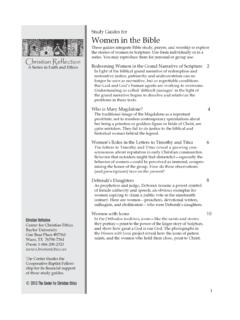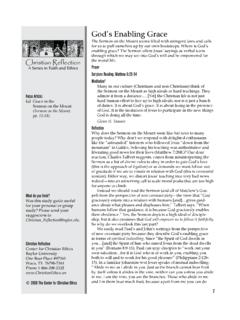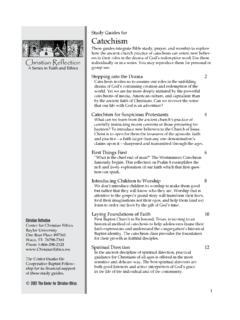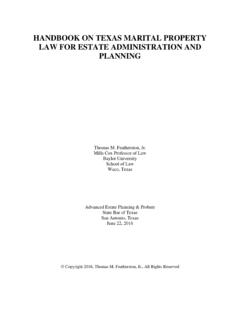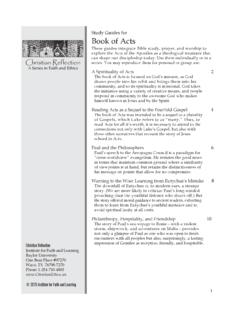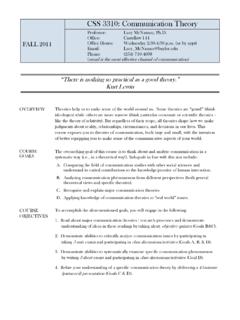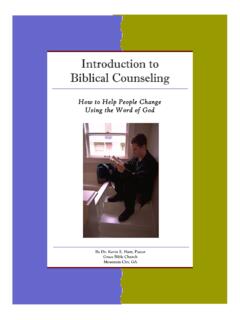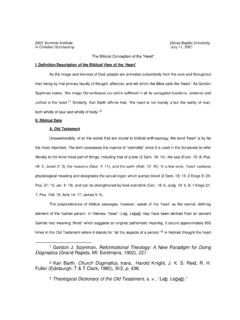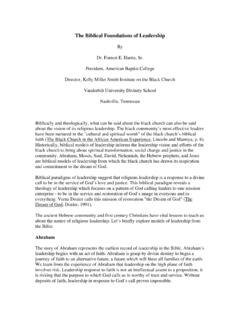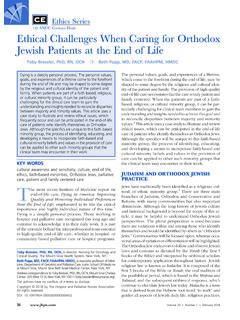Transcription of Women in Ministry: Beyond the Impasse - Baylor University
1 77 Women in ministry : Beyond the ImpasseBy Gretchen e. ZieGenhalsWhile most christians agree that Women should be allowed to exercise their God-given gifts of ministry , a sticking point between egalitarians and complementarians is whether certain leadership roles are off limits to Women . Both sides want to reach consensus, but are unsure of how to bridge the we still need to question the role of Women in ministry ? The answer is yes for many conservative evangelical Christians. For them, the issues surrounding Women in congregational ministry still provoke heated biblical , theological, and ecclesiological debate.
2 Despite the fact that we have Women serving in even the highest offices of government, evangelicals continue to examine Scripture in search of answers to questions about Women in ministry that are plaguing conservative congregations and seminaries. The issue came to a head in 2000, when the Southern Baptist Convention adopted the revised 2000 Baptist Faith & Message. To Article VI on The Church the statement was added: While both men and Women are gifted for service in the church, the office of pastor is limited to men as qualified by Scripture.
3 Article XVIII on The Family (which had been added in 1998) included this interpretation of Women s role in the home: A wife is to submit herself graciously to the servant leadership of her husband even as the church willingly submits to the headship of Christ. She, being in the image of God as is her husband and thus equal to him, has the God-given responsibility to respect her husband and to serve as his helper in managing the household and nurturing the next generation. 178 Women and the Church What exactly is it about Women in ministry that provokes such debate?
4 And what are the arguments for preventing Women from serving in church-es? While most evangelicals agree that Women should be allowed to exercise their God-given gifts of ministry , the sticking point seems to be whether or not particular leadership roles are off limits to Women . Some evangelicals have taken what they are calling an egalitarian position on the issues of Women in church leadership, while others assume a complementarian one. Both sides want to reach some consensus on the issue, but are unsure of how to bridge the believe that men and Women have been created equal-ly in God s image, but have different, complementary, God-ordained roles in both Church and home.
5 They also believe in male headship in the Church and the home and they believe that men should mirror God the father, whom they see as loving, wise, protective and all-knowing. For complemen-tarians, there are essential differences between men and Women that dictate their roles. Egalitarians, on the other hand, believe that not only have men and Women been created equally in God s image, but they have been gifted equally as well. No role or position in the church is limited to just one gender. Marriages are rooted ideally in negotiation, consensus, and mutual submission, not headship.
6 They think that exclusive male leadership in the Church and home represses Women and can at times lead to abuse. Margaret Kim Peterson notes that both egalitarianism and complemen-tarianism seem to be about the distribution of power. The egalitarians think power should be shared fifty-fifty; the traditionalists think the distribution should be, in the memorable phrase of one of my husband s first-year Bible students, sixty-forty in favor of the guy ( Women , ministry and the Gospel, p. 163).Three books help us sort through these arguments and understand the issues from evangelical viewpoints: editor James R.
7 Beck s revised edition of Two Views on Women in ministry (Grand Rapids, MI: Zondervan Publishing House, 2005, 359 pp., $ ); Mark Husbands and Timothy Larsen s collec-tion, Women , ministry and the Gospel: Exploring New Paradigms (Downers Grove, IL: Intervarsity Press, 2007, 304 pp., $ ); and Sarah Sumner s Men and Women in the Church: Building Consensus on Christian Leadership (Down-ers Grove: IL: IVP Books, 2003, 332 pp., $ ). While each book takes a different approach, these three works represent thoughtful, evangelical Christians who wish to engage in rational dialogue and build consensus with one another.
8 YTwo Views on Women in ministry offers the most cohesive, focused for-mat with which to approach the issues. A part of Zondervan s Counter-points: Exploring Theology series, its four contributors are all evangelical Women in ministry : Beyond the Impasse 79 New Testament scholars who hold seminary faculty positions. These simi-larities eliminate other variables from the discussion and help us focus on the scriptural texts that support or refute each position. Two of the schol-ars Craig S. Keener (Palmer Theological Seminary) and Linda L.
9 Belleville (Bethel College) consider themselves to be egalitarians, while two of them Thomas R. Schreiner (Southern Baptist Theological Seminary) and Craig L. Blomberg (Denver Seminary) self-identify as complementarians. After each of the four major essays, in which one of the authors lays out his or her scriptural justifications, the other three respond briefly. While the authors approaches are scholarly and focus on the exegesis of specific passages in question such as 1 Corinthians 14:34-35 or 1 Timothy 2:11-15, they maintain a lively balance between energetic debate, a history of obvious friendship, and a good-natured respect for one another s positions.
10 Beck notes in his introduction that as evangelicals still debate the issues of Women in ministry , we need to forge a Christ-honoring irenic spirit for the conversation. In this, the book is quite successful. Linda Belleville explains that the debate comes down to four questions: Does the Bible teach a hierarchical structuring of male and female relation-ships? Do we find Women in leadership positions in the Bible? Do Women in the Bible assume the same leadership roles as men? Does the Bible limit Women from filling certain leadership roles?

